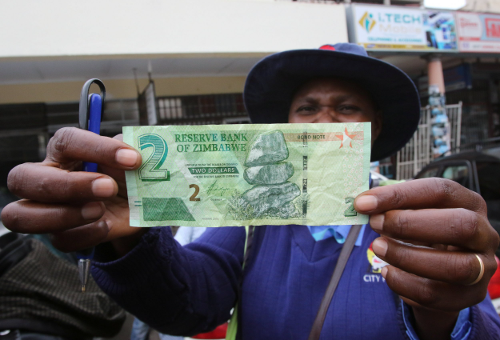Zimbabwe currency in free-fall amid plans to adopt gold standard

TLDR
- Zimbabwe experiencing significant currency depreciation against the US dollar, sparking speculation of a new exchange rate system, possibly backed by gold.
- Local dollar weakening since 2024, leading to substantial price hikes, like a loaf of bread jumping from Z$6,105 to Z$19,357 in 11 weeks, impacting purchasing power.
- Economist Tony Hawkins suggests government may be moving towards a new currency by allowing exchange rates to fluctuate freely, signaling a shift in policy.
Zimbabwe, once notorious for hyperinflation, is witnessing a significant depreciation of its currency against the US dollar, prompting speculation that the government may be considering a new exchange rate system, potentially backed by gold.
Since the beginning of 2024, the local dollar has steadily weakened against the US dollar, leading to a dramatic increase in prices. For example, the cost of a single loaf of bread has surged from Z$6,105 to Z$19,357 in just 11 weeks, severely eroding purchasing power. In the past, such rapid depreciation would have prompted intervention from the central bank to stabilize the exchange rate. However, this time, authorities have refrained from taking action.
According to Tony Hawkins, an economist and former professor at the University of Zimbabwe, the government's decision to allow the exchange rate to freely fluctuate suggests a potential shift towards introducing a new currency. This move reflects a departure from previous interventions aimed at defending the local currency's value.
Key Takeaways
Zimbabwe's latest attempt to establish a functional local currency marks the sixth effort since the economic crisis of 2008 when hyperinflation rendered the currency virtually worthless. Despite previous failures attributed to a lack of public confidence, President Emmerson Mnangagwa announced in February the government's intention to introduce a "structured currency." Finance Minister Mthuli Ncube suggested that this new currency might be backed by gold. However, the central bank's indefinite postponement of its monetary policy statement has raised concerns among investors. The delay has sparked speculation about potential disagreements among policymakers regarding the implementation of the proposed currency reform. Imara Asset Management, Zimbabwe's largest independent asset manager overseeing more than $100 million, noted the anxiety among investors and the uncertainty surrounding the rollout of the new currency plan.

Next Frontier
Stay up to date on major news and events in African markets. Delivered weekly.
Pulse54
UDeep-dives into what’s old and new in Africa’s investment landscape. Delivered twice monthly.
Events
Sign up to stay informed about our regular webinars, product launches, and exhibitions.




